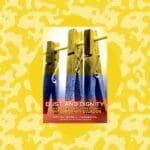 Erynn Masi de Casanova participated in the Bellagio residency program in 2017. During this residency, she worked on Dust and Dignity: Domestic Employment in Contemporary Ecuador (Cornell University Press, 2019). Erynn is Professor of Sociology at the University of Cincinnati. She is the author of Making Up the Difference and Buttoned Up, and with Afshan Jafar, she co-edited Bodies without Borders and Global Beauty, Local Bodies.
Erynn Masi de Casanova participated in the Bellagio residency program in 2017. During this residency, she worked on Dust and Dignity: Domestic Employment in Contemporary Ecuador (Cornell University Press, 2019). Erynn is Professor of Sociology at the University of Cincinnati. She is the author of Making Up the Difference and Buttoned Up, and with Afshan Jafar, she co-edited Bodies without Borders and Global Beauty, Local Bodies.
Dust and Dignity has won awards from the American Sociological Association and the Latin American Studies Association.
A few words with Erynn
“When I arrived at the Center, I had initially thought that there would be a chapter comparing the situation of domestic work in Ecuador with that in other Andean countries. I wrestled with that chapter at Bellagio and ultimately realized that the book didn’t need it. Having the time to work that out was crucial. And now I know how I might approach a comprehensive comparison in the future.
“Informal discussions at lunch or dinner were helpful in pushing my thinking forward. Being able to talk across disciplinary lines about the ways that capitalism and power structures play out in daily life – and seeing that non-sociologists thought I had a contribution to make with my work – these were the most valuable experiences.”
Quote from Dust and Dignity
“Upward mobility is largely out of reach. Life consists of “la lucha,” struggle; a metaphor but also a daily routine. La lucha is collective and individual. It involves both reacting to uncontrollable events – especially tough economic conditions that the women euphemistically referred to as ‘la situación’ – and also strategically planning and aspiring to better circumstances. When we begin to see domestic workers not as an isolated group, but as informal laborers and members of the working class, new possibilities emerge for solidarity among broader swaths of workers.”
Synopsis
What makes domestic work a bad job, even after efforts to formalize and improve working conditions? Erynn Masi de Casanova’s case study, based partly on collaborative research conducted with Ecuador’s pioneer domestic workers’ organization, examines the reasons for persistent exploitation.
Drawing on workers’ stories of lucha, trabajo, and sacrificio – struggle, work, and sacrifice – Dust and Dignity offers a new take on an old occupation. From the intimate experience of being a body out of place in an employer’s home, to the possibilities for radical collective action at the national level, this book shows how and why women do this precarious work and how they resist exploitation in the search for dignified employment.
From these searing stories of workers’ lives, Dust and Dignity identifies patterns in domestic workers’ experiences that will be helpful in understanding the situation of workers elsewhere and offers possible solutions for promoting and ensuring workers’ rights that have relevance far beyond Ecuador.
Explore More
To find out more about Erynn’s work, you can visit her University of Cincinnati profile or you can follow her on Twitter.
If you wish to engage with the themes of Erynn’s work, you can read more about the International Domestic Workers’ Federation.